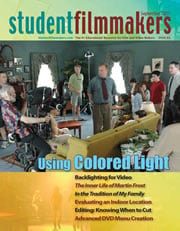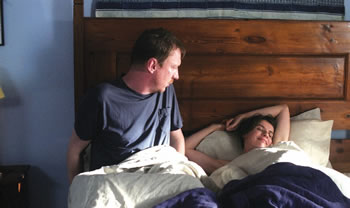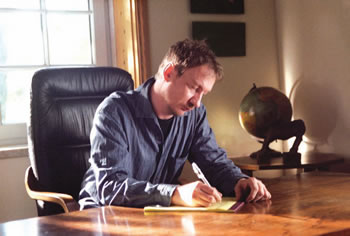HOW-TO, Techniques, & Best Practices Channel
| A Conversation with Award-Winning Writer and Director Paul Auster: The Inner Life of Martin Frost By Staff posted Oct 18, 2009, 20:12 |
Check out this article in the print edition of StudentFilmmakers Magazine, September 2007. Click here to get a copy and to subscribe >>
 A Conversation with Award-Winning Writer and Director Paul Auster
A Conversation with Award-Winning Writer and Director Paul Auster
The Inner Life of Martin Frost
| Continued on Next Page> | Page 1 | 2 | 3 |
The Inner Life of Martin Frost appears partially in narrative form in award-winning author Paul Auster’s best-selling novel, “The Book of Illusions.” The story now comes to life in the feature film, a philosophical mystery, written and directed by Paul Auster, and starring David Thewlis, Irène Jacob, Michael Imperioli, and Sophie Auster.
The story centers on writer Martin Frost, who just after settling into a friend’s empty house, gets a new idea for a story, and the next day discovers a beautiful woman, Claire, sharing the house with him. The two fall in love, but is Claire really the person she claims to be?

Martin Frost (David Thewlis) and Claire (Irène Jacob) in a scene from The Inner Life of Martin Frost.

Martin Frost (David Thewlis) in a scene from The Inner Life of Martin Frost.
Paul Auster speaks with StudentFilmmakers magazine about the making of Martin Frost, getting distribution for his film, and shares some of his insights and experiences after returning to the director’s chair.
A personal quote from you says, “Becoming a writer is not a career decision like becoming a doctor or a policeman. You don’t choose it so much as get chosen, and once you accept the fact that you’re not fit for anything else, you have to be prepared to walk a long, hard road for the rest of your days.” Could you explain what this means, ‘to walk a long, hard road’?
Paul Auster: Well, I suppose it has to do with many things all at once. In the beginning, there’s the pressure you put on yourself to try to produce work that you feel is decent, good, valuable. Then there’s the difficulty of trying to get published in the beginning, if anybody else thinks that what you’ve done has any merit at all. And then, of course, there are the financial problems. People get lucky, but you certainly can’t count on it.
Could you give us an example from your own experience?
Paul Auster: Well, to make a very long story short, I could just tell you that I started writing as a teenager in high school, but I never actually made any money for writing – any money that was of any significance until I was forty years old. So I was doing many other things to support myself. And sometimes, I was really quite desperately poor, I have to say.
Would you say that any changes have taken place in the industry over the years? Is it still the same for a writer nowadays?
Paul Auster: I think the culture’s changed. I think there is a kind of dumbing down of American life, as everyone says, and I tend to agree with it. If you take, for example, the New York Times Book Review, back in the old days when I was starting out, it was sixty-four to eighty pages a week. And now, it’s usually about sixteen. So, coverage of books has diminished considerably, and publishing itself has become more and more commercial. The transit isn’t so encouraging, but at the same time, there are good writers all over the place. So, it’s not as grim as it might be, but certainly, things have changed, there’s no question about it.
How did you make the transition from author to film director?
Paul Auster: Well, I always loved movies starting from childhood. At one point, when I was about eighteen or nineteen, I thought maybe I should become a film director. I was actually thinking about going to film school. But as I realized that I was so shy at that point, I could barely speak to anybody – I could speak one-on-one with people but never in groups – and I thought, well, how can I be a film director if I can’t communicate with anybody? So, I gave up the idea, but I continued to be a maniac for watching film. Then, ironically enough, when I started publishing novels, filmmakers started contacting me, either to adapt works of mine, or to write screenplays for them.
I guess the real step forward was working with Wayne Wang on two films, Smoke and Blue in the Face, which we made together. I wrote Smoke, and he directed it, but we were co-filmmakers in the sense that we did all the pre-production together, we did all the rehearsals together, and we did all the post production together – editing, music, credits, everything. So, working on that film with Wayne was like going to film school. I learned an awful lot. And, I became a director by accident.
We started making our second film, Blue in the Face, right after Smoke. We finished Smoke on a Friday; we started Blue in the Face the next Monday. But it was a very hot summer – stifling heat. Wayne got sick, and so he couldn’t come to the set. Suddenly, he calls and he says, Paul, you take over, you can do it. And so, I just did it, and it was a remarkable experience; and I loved it.
| Continued on Next Page> | Page 1 | 2 | 3 |